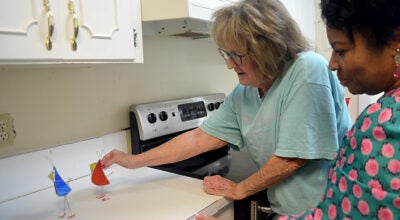Telehealth’s future explored
Published 3:00 am Thursday, November 3, 2016
“Our lives improve not at the moment of invention, but when we accept it as essential.”
Michael Smith, director of the Alabama Public Health Training Network, used that quote to frame the state of telehealth in Alabama.
Smith was the guest speaker at Wednesday’s meeting of the Pike County Chamber of Commerce committee on health and human services.
Around 40 local health professionals attended the luncheon to hear Smith explain the state of telehealth in Alabama and the Alabama Department of Public Health’s (ADPH) plan to create a statewide telehealth network.
“It’s not a matter of whether it will happen but when it will happen,” Smith told the crowd.
Telehealth is the use of telecommunications to give patients access to health specialists through local health providers. Specifically, telehealth employs live video-streaming to allow doctors and patients to communicate over long distances. With the help of clinicians at the patient’s site, doctors can even remotely use a stethoscope and oversee other basic functions of a physical exam.
Smith said several telehealth hubs already exist in the state, but the ADPH wants to connect those hubs into a statewide network.
“What we’re working to do is connect all these hubs and get a truly statewide network,” Smith said.
One key point of Smith’s presentation answered the question about how telehealth would affect the medical workforce, which several of the attending medical professionals asked about during the meeting.
“We want to make sure all clinicians understand it is a delivery system,” Smith said. “It doesn’t replace a clinician’s work or care with the patient. It’s merely delivering information from the patient directly or clinical information such as heart and lung sounds and so forth.”
Another big question that Smith answered was why it hasn’t been employed widely yet in Alabama.
“The reason it hasn’t really taken off statewide is because it’s not really a sustainable business yet in Alabama,” Smith said. “When we talk to providers that are very interested in telehealth, they’ll be very excited. But invariably, the conversation will come around to ‘How am I going to be reimbursed?’”
Smith explained that 30 states have enacted “parity legislation” that insures that providers are reimbursed the same for telehealth as if the patient was at the provider’s office. Alabama is one the states that has not passed parity legislation.
That hasn’t stopped ADPH from actively pursuing the creation of the network though. The department made six $10,000 carts to put in six counties to facilitate telehealth.
Another project that Smith said the department is working on include telehealth to have mental counseling for veterans, which he said should be out within a month.




